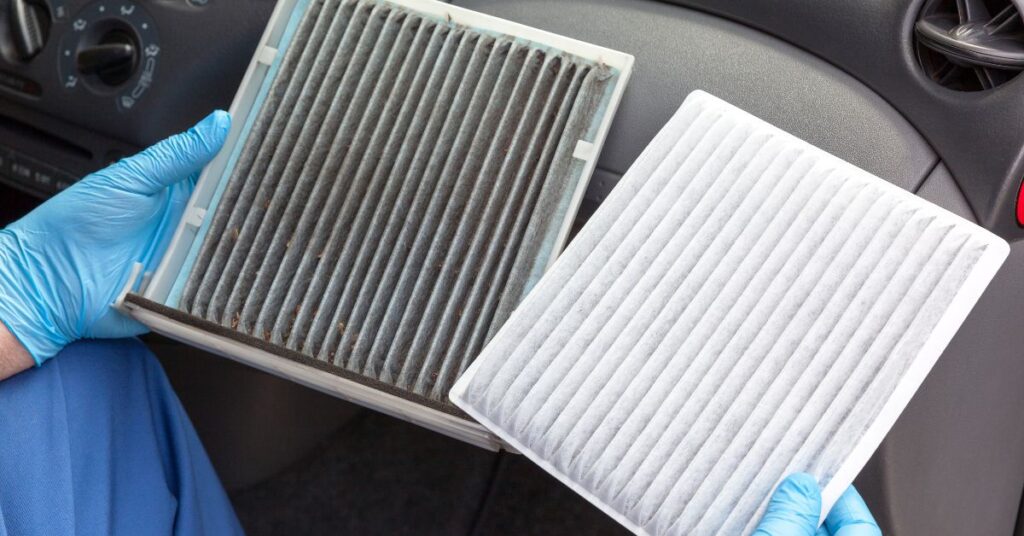
Table of Contents
Regular service is essential in maintaining the integrity and performance of your vehicle. Often overlooked, filter replacement is crucial to your car’s health. Modern vehicles typically contain four different filters: the cabin air filter, engine air filter, fuel filter, and oil filter. Regularly changing these filters offers numerous benefits, ensuring your vehicle runs smoothly and efficiently.
What Does The Cabin Air In A Car Filter Do?
The cabin air filter is a silent guardian of your vehicle’s interior air quality. It diligently filters out dust, smoke, and odors, ensuring a clean and pleasant environment inside your car. Given Atlanta’s dusty construction areas, cabin air filters in this region might need more frequent attention. Typically, these filters should be replaced every 15,000 to 25,000 miles or at least once a year.
Benefits of Changing Your Cabin Air Filter
Improved Air Quality Inside the Car
The cabin air filter plays a crucial role in filtering out dust, pollen, and other pollutants from the air entering the vehicle’s interior. Regularly changing this filter ensures that the air inside your car remains clean and free from allergens and pollutants. This is especially beneficial for people with allergies or respiratory issues.
Enhanced HVAC System Efficiency
A clean cabin air filter also means an efficient HVAC system. It allows for smoother airflow, improving your car’s heating and cooling efficiency. This ensures a comfortable drive and reduces the strain on your car’s HVAC system, potentially saving you from expensive repairs.
Prevents Window Fogging
Replacing your cabin air filter also combats window fogging. A new filter ensures proper air circulation, reducing moisture buildup, which is a critical factor in maintaining clear visibility for safe driving.
Eliminates Unpleasant Odors
Over time, cabin air filters can trap odors along with pollutants. Changing this filter regularly helps eliminate unpleasant smells, such as exhaust fumes or mustiness, ensuring a more pleasant driving experience.
What Does The Engine Air Filter In A Car Do?
Your engine relies on clean air for optimal performance. The engine air filter is a barrier against dust and debris, ensuring that only clean air reaches your engine. Neglecting this filter can lead to many problems, including poor performance and reduced fuel economy. It’s recommended to replace engine air filters every 15,000 to 30,000 miles.
Benefits of Changing Your Engine Air Filter
Improved Engine Performance and Efficiency
The engine air filter is responsible for keeping harmful contaminants like dust, dirt, and debris from entering the engine. A clean filter ensures optimal airflow to the engine, which is vital for maintaining efficient combustion and overall engine performance. Regularly changing this filter can lead to better fuel economy and more responsive acceleration.
Prolonged Engine Life
Regularly changing the engine air filter also protects your engine from abrasive particles. This proactive step reduces wear and tear on internal components, extending the engine’s lifespan and ensuring optimal health.
Reduction in Emissions
A clean engine air filter aids in efficient fuel combustion, which can lead to reduced exhaust emissions. This benefits the environment and helps your car comply with emission standards.
Protection Against Engine Contaminants
In addition to dust and dirt, engine air filters capture other harmful contaminants, such as leaves or insects, that can potentially cause damage to internal engine components. Regular replacement offers continuous protection from these elements.
What Does The Fuel Filter In A Car Do?
Fuel filters are vital in keeping your engine’s performance at its peak. They trap impurities in the fuel, preventing them from reaching and harming the engine. Delaying fuel filter replacement can lead to engine sludge build-up. Generally, fuel filters should be replaced every 30,000 miles, depending on your driving habits and environment.
Benefits of Changing Your Fuel Filter
Maintained Fuel Efficiency
The fuel filter removes contaminants from the fuel before it reaches the engine. A clean fuel filter ensures that only clean fuel is delivered, helping to maintain optimal engine performance and fuel efficiency. Regularly changing the fuel filter can prevent poor acceleration, decreased power, and other performance issues related to fuel impurities.
Reduced Risk of Engine Repairs
Contaminants in the fuel can cause significant damage to the engine and fuel injectors. By regularly changing the fuel filter, you minimize the risk of contaminants damaging these critical components, thereby reducing the likelihood of costly engine repairs and maintenance.
Helps Prevent Fuel System Blockages
Over time, the fuel filter can become clogged with particles and debris, which can obstruct fuel flow. Regular replacement prevents blockages in the fuel system, ensuring smooth fuel delivery and preventing stalling or difficulties in starting the engine.
Enhances Overall Vehicle Reliability
Regular fuel filter replacement contributes to your vehicle’s overall reliability, particularly under demanding conditions, helping to avoid unexpected breakdowns.
What Does The Oil Filter In A Car Do?
The purpose of engine oil is to keep your engine’s mechanical parts lubricated. As the oil gets dirty, it gets sludgy and can cause your engine to underperform. Replacing the oil filter during each oil change is crucial for your engine’s health.
Benefits of Changing Your Oil Filter
Enhanced Engine Lubrication
A new oil filter ensures clean oil circulates through the engine, providing optimal lubrication. This reduces friction and prevents engine overheating, maintaining efficient engine operation.
Extended Engine Life and Performance
Regular oil filter changes are key in maintaining engine health and performance. They prevent sludge buildup, ensuring your engine runs smoothly for a more extended period.
Improves Gas Mileage
Clean oil means an efficiently running engine. By ensuring optimal lubrication, a fresh oil filter can contribute to improved gas mileage.
Supports Engine Cooling
The oil filter plays a role in the engine cooling process. Removing debris ensures that the oil can effectively cool engine components, preventing overheating.
Contact McCullough NAPA Auto Care To Replace Your Car’s Filters
Maintaining your vehicle’s filters is vital for its performance and longevity. At McCullough NAPA Auto Care, we offer comprehensive filter replacement services. We can also help you set up a 30K/60K/90K mile maintenance plan, ensuring your car receives all necessary services within the recommended timeframe. Regular filter changes improve your vehicle’s performance and provide a more enjoyable and safer driving experience.
Contact us today to schedule your filter replacements and keep your car running at its best.

